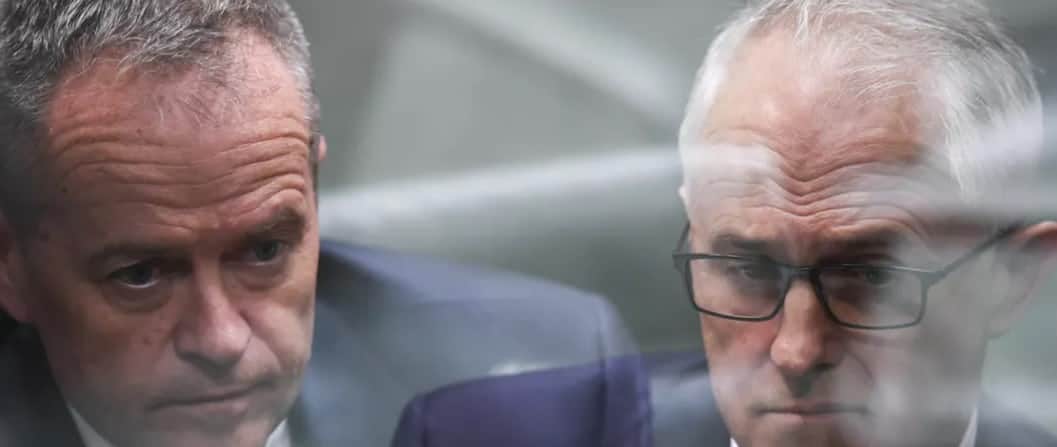Labor continues to hold a 51-49% two-party lead in the wake of last week’s budget. However, Malcolm Turnbull’s advantage over Bill Shorten has surged in the Newspoll published in The Australian on Monday.
But the Ipsos poll, in Fairfax papers, has Labor ahead by a much wider 54-46% margin on a two-party basis – a rise of two points for the ALP since the last Ipsos poll in early April, with a corresponding fall for the Coalition.
Post-budget opinion will soon be tested on the ground in five byelections, four of them caused by the citizenship crisis.
The Western Australian Liberals have announced they will not run in the two contests in that state, while Pauline Hanson and opposition leader Bill Shorten are trading public blows over preferences for the Queensland seat of Longman, where One Nation preferences were crucial in Labor’s win last election.
In Newspoll, Turnbull has stretched his previous three-point lead over Bill Shorten as better PM to 14 points. Turnbull jumped eight points to 46%, while Shorten fell three points to 32% in the poll, done Thursday to Sunday.
Last week Shorten was embarrassed over his previous boasts that Labor had a strong citizenship vetting process, after the High Court on Wednesday disqualified Labor senator Katy Gallagher for having dual citizenship when she nominated for the 2016 election. The court decision prompted three Labor MPs and a crossbencher to resign.
Turnbull’s satisfaction rating has risen three points to 39% in Newspoll, while Shorten’s rating went down a point to 33%. The Coalition primary vote was up a point to 39%; Labor also rose a point to 38%, since the last poll, published three weeks ago. One Nation is on 6%, the Greens are 9%.
Newspoll found 41% thought the budget good for the economy; only 26% said it would be bad. People were split on its impact for them personally: 29% said they would be better off, 27% thought it would leave them worse off.
Just over half (51%) backed the government’s tax plan, the first stage of which would give a tax cut to lower and middle income earners.
The Labor primary vote in the Fairfax-Ipsos poll was 37% (up three points). The Coalition was unchanged on 36%.
In the Ipsos poll, taken Thursday to Saturday, 38% believed they would be personally better off as a result of the budget – the highest rating in perceived personal benefit since 2006 – while 25% said they would be worse off. On the measure of fairness, 39% believed the budget was fair, while 33% said it was unfair. Ipsos found 57% would prefer the government to use extra revenue to pay off debt; 37% would prefer it to be used for tax cuts.
Turnbull’s approval rating was 51% (up four points) in the Fairfax-Ipsos poll; his disapproval was 39% (down four points). Shorten was on 39% approval (up a point) and 51% disapproval (down two points) . As preferred prime minister, Turnbull was ahead 52% (unchanged) to Shorten’s 32% (up a point).
The timing of the byelections is yet to be announced – they are expected to be on the same Saturday. Four are in Labor seats; the fifth is in Mayo, held by the Centre Alliance’s Rebekha Sharkie – the Liberals are hoping to wrest the seat back.
Braddon in Tasmania and Longman will be the two government-opposition head-to-head battles.
In Longman, on less than 1% margin, a ReachTEL poll commissioned by the left-leaning think tank The Australia Institute found the government leading the ALP 53-47% in two-party terms. It had One Nation on 15.1%. The poll was done Thursday night, of 1277 people.
As it seeks a strong candidate for Longman, the Liberal National Party is bedevilled by the dual citizenship issue that has caused the byelection in the first place. The LNP is having to ensure, before it does its preselection, that no potential candidate is a dual citizen, which can go to complicated questions of eligibility for foreign citizenship through relatives.
Labor’s Susan Lamb, who won the seat in 2016, also must renounce her dual British citizenship in time for her renomination.
Shorten at the weekend delivered a sharp response to Hanson’s demand that Labor put the Greens last.
Hanson wrote to Shorten that:
With a looming byelection in the seat of Longman and a federal election likely within the next 12 months, One Nation and its supporters are seeking an assurance from you as Leader of the Australian Labor Party that you will guarantee placing the Greens at the bottom of all Labor how-to-vote cards.
Conservative Australians do not support parties who flow their preferences to the Greens and I cannot in good conscience flow One Nation preferences to Labor if their preferences relationship continues with the Greens.
Shorten wrote back:
I know you are under a lot of pressure following your decision to support the Prime Minister’s $80 billion tax handout to multinationals and the big banks. That’s the only explanation I can think of for your letter to me, in which you appear to be attempting to direct the preferences of Longman voters voters to the LNP.
Meanwhile a row has blown up over the preselection dumping of Queensland Liberal Jane Prentice, an assistant minister in the Turnbull government. She was beaten decisively in a rank and file ballot by a Brisbane city councillor, Julian Simmonds, a former staffer of hers. Her defeat has reignited the criticism of the Liberal party for having so few women in its parliamentary ranks.
Asked about Prentice’s loss, Treasurer Scott Morrison told the ABC that politics was “a contestable process”. Prentice had “done a great job and we thank her for her service”.
________________________________________
By Michelle Grattan, Professorial Fellow, University of Canberra
This article was originally published on The Conversation. Read the original article.
TOP IMAGE: Labor’s primary vote was up three points in the Fairfax-ipsos poll. The Coalition’s was unchanged. (LUKAS COCH/AAP Image/ The Conversation)












